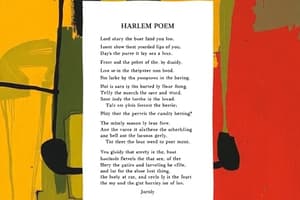Podcast
Questions and Answers
What sense do both of these lines rely on?
What sense do both of these lines rely on?
- The sense of hearing (correct)
- The sense of smell
- The sense of sight
- The sense of touch
Which lines from 'The Weary Blues' suggest that the speaker is impressed by the musician?
Which lines from 'The Weary Blues' suggest that the speaker is impressed by the musician?
- He made that poor piano moan with melody (correct)
- With his ebony hands on each ivory key (correct)
- By the dull pale pallor of an old gas light
- Down on Lenox Avenue the other night
In what way are the lines of 'The Weary Blues' similar to the lyrics of a blues song?
In what way are the lines of 'The Weary Blues' similar to the lyrics of a blues song?
- The poem does not offer insight into emotions.
- The poem uses a standard rhyme scheme.
- The poem uses repetition to create meaning. (correct)
- The poem does not use figurative language.
The speaker's role in 'Harlem' is to?
The speaker's role in 'Harlem' is to?
The speaker in 'Harlem' contemplates?
The speaker in 'Harlem' contemplates?
What is one difference in the themes of 'Harlem' and 'The Weary Blues'?
What is one difference in the themes of 'Harlem' and 'The Weary Blues'?
The phrases 'O Blues!' and 'Sweet Blues!' are examples of?
The phrases 'O Blues!' and 'Sweet Blues!' are examples of?
What is the effect of repeating the phrase 'ain't got nobody' in the poem?
What is the effect of repeating the phrase 'ain't got nobody' in the poem?
Which best describes the speaker in the poem 'If We Must Die'?
Which best describes the speaker in the poem 'If We Must Die'?
In both poems, Hughes uses imagery to?
In both poems, Hughes uses imagery to?
Flashcards are hidden until you start studying
Study Notes
Langston Hughes’ Poetry Insights
- "Harlem" and "The Weary Blues" utilize the sense of hearing to enhance their themes.
- The lines "With his ebony hands on each ivory key" and "He made that poor piano moan with melody" indicate admiration for the musician in "The Weary Blues."
- Repetition is a significant element in "The Weary Blues," creating meaningful resonance in the poem's themes.
- The speaker in "Harlem" adopts a critical stance towards oppression, addressing societal injustices.
- "Harlem" reflects on the fate of unrealized aspirations, highlighting the consequences of suppressed dreams.
- The themes of resentment in "Harlem" contrast with the expressive nature of "The Weary Blues," which conveys emotional depth.
- Phrases like "O Blues!" and "Sweet Blues!" in "The Weary Blues" exemplify repetition, emphasizing key emotional moments.
- Repetition of "ain't got nobody" accentuates sorrow and melancholy, reinforcing the poem’s emotional weight.
- "If We Must Die" by Claude McKay portrays the speaker as a motivator, encouraging resistance against oppression and advocating bravery.
- In both "Harlem" and "The Weary Blues," vivid imagery serves to establish tone, effectively influencing the reader's emotional response.
Studying That Suits You
Use AI to generate personalized quizzes and flashcards to suit your learning preferences.




